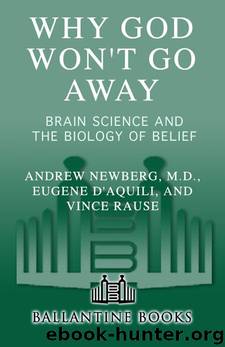Why God Won't Go Away: Brain Science and the Biology of Belief by Newberg M.d. Andrew & Eugene G. D'Aquili & Vince Rause

Author:Newberg M.d., Andrew & Eugene G. D'Aquili & Vince Rause
Language: eng
Format: mobi
Publisher: Ballantine Books
Published: 2008-12-09T16:00:00+00:00
THE NEUROBIOLOGY OF MYSTICAL EXPERIENCE
It’s difficult for those of us living in the practical world, and coping from day to day with the mundane challenges of existence, to comprehend in any meaningful way the mystical sense of transcendent unity described by saints and sages. It all seems so hopelessly cryptic, so unlikely, so irrelevant to what we think of as real. In its essence, however, mystical experience is not as strange as it seems, and the first step in understanding its nature is to realize that it happens to all of us, all of the time.
Humans, in fact, are natural mystics blessed with an inborn genius for effortless self-transcendence. If you ever “lost yourself” in a beautiful piece of music, for example, or felt “swept away” by a rousing patriotic speech, you have tasted in a small but revealing way the essence of mystical union. If you have fallen in love or have ever been wonder-struck by the beauty of nature, you know how it feels when the ego slips away and for a dazzling moment or two you vividly understand that you are a part of something larger.
Like all experiences, moods, and perceptions, these unitary states are made possible by neurological function. More specifically, they are the result of the softening of the sense of self and the absorption of the self into some larger sense of reality that we believe occurs when the brain’s orientation area is deafferented, or deprived of neural input.
We’ve already seen how the rhythmic behaviors of religious ritual can set the mechanism of deafferentation in motion, and how that process can lead to moments of transcendent spiritual unity. The same chain of events can be set in motion less formally by patterns of behavior that have no spiritual intent but are, nonetheless, ritualistic.
For example, imagine that you have just come home from a hard day at work. It is Friday night and a pleasant weekend lies ahead. To soak away the cares of the workweek, you decide to take a leisurely bath. You light a few candles, pour yourself a glass of wine, tune the radio to your favorite station, and slip into the tub.
Without intending to, you have nicely set the stage for ritual. The candles, the wine, the relaxing effects of the bath have all helped mark this moment with a sense of occasion. Like the atmospheric accents and marked actions that enhance the effects of religious ritual, these elements inform the mind, by stimulating limbic and autonomic activity, that something special is going on.
As you relax in the tub, the radio begins to play a soft romantic ballad. The slow, steady rhythms activate the body’s quiescent system. As quiescent activity rises, it causes the hippocampus to exert a mild inhibition on neural flow, which would cause a slight deafferentation of the orientation area, and a mild unitary state that might be experienced as a very pleasant surge of serenity.
If the music continues, however, and quiescent levels continue to rise, that serenity
Download
This site does not store any files on its server. We only index and link to content provided by other sites. Please contact the content providers to delete copyright contents if any and email us, we'll remove relevant links or contents immediately.
The Lost Art of Listening by Michael P. Nichols(7494)
Why I Am Not A Calvinist by Dr. Peter S. Ruckman(4149)
The Rosicrucians by Christopher McIntosh(3513)
Wicca: a guide for the solitary practitioner by Scott Cunningham(3167)
Signature in the Cell: DNA and the Evidence for Intelligent Design by Stephen C. Meyer(3132)
Real Sex by Lauren F. Winner(3014)
The Holy Spirit by Billy Graham(2944)
To Light a Sacred Flame by Silver RavenWolf(2814)
The End of Faith by Sam Harris(2733)
The Gnostic Gospels by Pagels Elaine(2527)
Waking Up by Sam Harris(2454)
Nine Parts of Desire by Geraldine Brooks(2361)
Jesus by Paul Johnson(2352)
Devil, The by Almond Philip C(2325)
The God delusion by Richard Dawkins(2305)
Heavens on Earth by Michael Shermer(2278)
Kundalini by Gopi Krishna(2180)
Chosen by God by R. C. Sproul(2161)
The Nature of Consciousness by Rupert Spira(2104)
